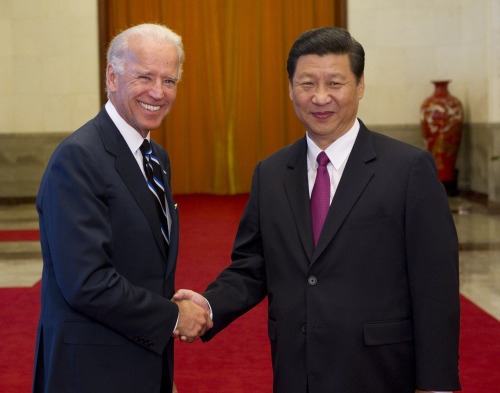BEIJING (AP) ― Stressing the importance of personal ties, Vice President Joseph Biden sat down Thursday with his Chinese counterpart and the country’s leader-in-waiting for talks that will focus largely on U.S. economic woes.
Biden was given an honor-guard welcoming ceremony before meeting Xi Jinping, who is expected to take over as Communist Party chief next year.
 |
Xi Jinping (right) holds a welcoming ceremony for U.S. Vice President Joe Biden in Beijing on Thursday. (Xinhua-Yonhap News) |
Biden said ahead of the talks that it is of “the utmost importance” to develop a close relationship with China.
“I would suggest that there is no more important relationship that we need to establish on the part of the United States than a close relationship with China,” he said.
“I am absolutely confident that the economic stability of the world rests in no small part on cooperation between the United States and China,” he said.
In the run-up to Biden’s visit, Chinese commentators and media have sounded a drum beat on what the United States should do about its struggling economy, especially in the wake of the downgrade in the U.S. credit rating.
But the main purpose of Biden’s trip is get a better read on Xi, who will visit Washington later this year.
Besides meetings in Beijing, Xi will accompany Biden on a visit to Sichuan province. The U.S. vice president will deliver a speech in Sichuan, which was badly hit by an earthquake in 2008.
“I came away from our visit ... greatly impressed ― impressed with your openness,” Biden said. “It is my fond hope that our personal relationship will continue to grow.”
Biden is expected to raise human rights issues, according to State Department spokeswoman Victoria Nuland, who said Wednesday in Washington that she believed Biden “will certainly talk about human rights in general.” She did not give specifics.
But China’s worries about the U.S. economy are the subtext for the five-day visit.
Beijing’s biggest fear is a possible third round of bond-buying by the Federal Reserve, known as quantitative easing, or QE. It is supposed to push down interest rates and boost investment by injecting money into the economy, but Beijing worries that it will boost prices of commodities traded in dollars, fuel inflation and erode the value of its $1.2 trillion in Treasury debt.
Xi said the financial crisis meant the countries had to work closely together.
“I too believe that under the new situation, China and the United States have ever more extensive, common interests, and we shoulder ever more common responsibilities,” he said.
Beijing has repeatedly appealed to Washington to protect foreign investors and the dollar. It has avoided publicly making specific demands, but this week’s commentaries in the entirely state-controlled press offered up advice focusing on longer-term reforms to cut its budget and trade deficits, raise savings and create jobs.
Biden is expected to get an earful on Taiwan, the democratic island Beijing claims and which Washington provides arms to.
The next flash point could come soon as the United States is expected to decide by Oct. 1 on Taiwan’s long-mooted bid to buy relatively advanced F-16 C/D fighter jets.
The official China Daily said Thursday that the arms sales were the biggest source of disagreement between the countries, and warned in an editorial that it “may disrupt the improving relationship between the two powers.”





![[Herald Interview] 'Trump will use tariffs as first line of defense for American manufacturing'](http://res.heraldm.com/phpwas/restmb_idxmake.php?idx=644&simg=/content/image/2024/11/26/20241126050017_0.jpg)


![[Herald Review] 'Gangnam B-Side' combines social realism with masterful suspense, performance](http://res.heraldm.com/phpwas/restmb_idxmake.php?idx=644&simg=/content/image/2024/11/25/20241125050072_0.jpg)